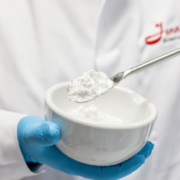As food producers are taking up current health and sustainability trends more and more, the next EFIB (30 September??2 October, 2019) will see a lot of technology providers and ingredient producers showcasing biotechnological solutions in Brussels. European Biotechnology spoke with Dr Gerhard Schmid, Head, Wacker Biosolutions, about the market, challenges, and growth strategies within the bioeconomy.
ADVERTISEMENT
By Ute Kilger, Patent Attorney, European Patent and Trade Mark Attorney, Boehmert & Boehmert Anwaltspartnerschaft mbB
The Life Science Industry needs a strong, predictable, reliable patent system that incentivizes innovations in order to bring new drugs and diagnostics to the patient, drives innovations and prevents patent abuse. The US Supreme Court has rendered a series of decisions about patent eligibility (§101 of the Patent Act) that make entire parts of Life Science Technology ineligible for patent protection and/or renders granted patents unenforceable. This makes the patent system unreliable and unpredictable and averse to investment into innovations. Change will need to come from Congress. Recently, a group of Senators and Representatives of the US Congress released the draft text of a bipartisan, bicameral proposal to reform Section 101 of the Patent Act. The initiative to reform Section 101 of the Patent Act needs political support from all life science stakeholders including from those in Biotech.
The recently released IACG report testifies that the antimicrobial resistance (AMR) problem is now receiving some echo at the political level. Literature exploring ways to fix the acknowledged market failure is growing. Stakeholder meetings deciphering the impact of the proposed models are being organised all over the world. Still, time is against us.
Rare functional sugars provide huge market opportunities. European Biotechnology spoke with Stefan Jennewein, Founder and CEO of Jennewein Biotechnologies, about the company’s strategy and its latest expansions to the Chinese market.
With partner Indivior exchanging a late-stage addiction programme for early-stage alternatives, 2019 did not start exceptionally well for Addex Therapeutics. But, the Swiss drug developer has shown the stamina to withstand far more serious setbacks in the past. For EuroBiotech, Addex’s CEO Tim Dyer recounts the company’s history and outlines its future.
Within the record time of nine months, the Austrian government, together with experts of the Austrian Bioeconomy plattform and the sustainability think tank Denkstatt, has worked out a national bioeconomy strategy. European Biotechnology spoke with Josef Plank, Secretary General at the leading Federal Ministry of Sustainability about the focus and ambition of the national initiative.
Antimicrobial resistance (AMR) is a global threat, particularly given the modest activity in the pipeline of new antimicrobials in development, and emerging resistance to existing antibiotics. In 2016, Lord Jim O’Neill published a globally-focused review on AMR, which highlighted the lack of incentives for new antimicrobial development and encouraged a worldwide system of push’ and pull’ incentives to stimulate new drug development.
According to the FMD 2011/62, serialisation of all prescription drug packs in Europe will inevitably become a daily routine for the pharmaceutical industry from 2019. European Biotechnology spoke with Philip Falkenstein, Product Manager at Bähren Druck, about the use of pre-serialised labels as solution for special implementation areas and the current legal framework.
In February, Johnson & Johnson Innovation, JLABS opened its first European open innovation incubator, JLABs @ BE, at the heart of the Beerse Janssen R&D Campus in Belgium. European Biotechnology spoke with Günter Huhle, Head of Johnson & Johnson Innovation JLABS EMEA, about Johnson & Johnson‘s approach to open innovation and its tremendous global innovation network, currently comprising ten incubators and over 420 companies that have collectively raised over US$10bn in growth capital.
Big Pharma’s interest in R&D on anti-infectives declined when other areas like oncology began offering higher returns. A few biotechs mirror pharma (Basilea, Idorsia and Polyphor), but could stay hidden gems.











